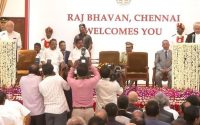$100 Website Offer
Get your personal website + domain for just $100.
Limited Time Offer!
Claim Your Website Now27 employees of private university get Madras high court reprieve
Source: deccanchronicle.com
Chennai: Coming to the rescue of 27 employees of Manonmaniam Sundaranar University, who had put in 9 to 10 years of service as Skilled NMR on daily wages initially and thereafter on consolidated appointment, but were issued with disengagement memo, the Madras high court has directed the University to consider their representations, to be made afresh, in accordance with law and also in the light of regularization made in respect of similarly situated persons, within 4 weeks.
Justice R.Mahadevan gave the directive while disposing of the petitions from V.Srinivasan and 26 others.
According to petitioners, pursuant to a notification issued by the University, they applied for the post of Skilled NMR. The University, after completion of selection process, such as certificate verification, written examination and interview, appointed them as Skilled NMRs and after sometime, they got consolidated appointment. In the minutes of the meeting held on February 7, 2015, the Syndicate sub-committee held that the consolidated skilled NMRs, on completion of five years of service, would be made permanent/regularized and in accordance with the recommendation, they made a request to absorb them as Junior Assistant. But the University rejected their claim. While so, to their shock and surprise, the University issued a notification calling for application for various posts. Consequently, disengagement memos were issued against them, they added.
The judge said though it has been submitted that the appointment of the petitioners were not in accordance with the constitutional scheme of employment and the constitutional scheme of employment requires public notification, inviting applications from all eligible candidates, the fact remains that the petitioner were appointed as skilled NMRs by public notification, after undergoing certificate verification, written examination and interview. Thereafter, they were appointed on consolidated basis in the year 2009 and completed 9 to 10 years of service in the University. Even though it was stated on the side of the university that the University has the authority to engage temporary employees in emergent situations, the question now arises for consideration was, how long the emergent situation would remain. If the petitioners have been appointed in an emergent situation, this court was unable to understand as to why the University has not taken steps to fill up the regular vacancies, even at this length of ti
me, the judge added.
The judge said the authorities would have very well aware of the statutory rules of the University as well as the other rules in force, which may come to the aid of the incumbents like that of the petitioners, if they put up their services up to a certain period. In the circumstances, the University should have been cautious enough, and had they been cautious, this type of situation would have been avoided. The university has all along been permitting the petitioners to work all these years, coupled with the fact that the similarly situated persons have been given regular appointment. This led to a legitimate expectation in the minds of the petitioners that they would be given regular appointment. “In these circumstances, this court is of the view that a duty is cast upon the respondents (University) to review their orders impugned herein by considering the plight of the petitioners, if they are otherwise found eligible”, the judge added.



